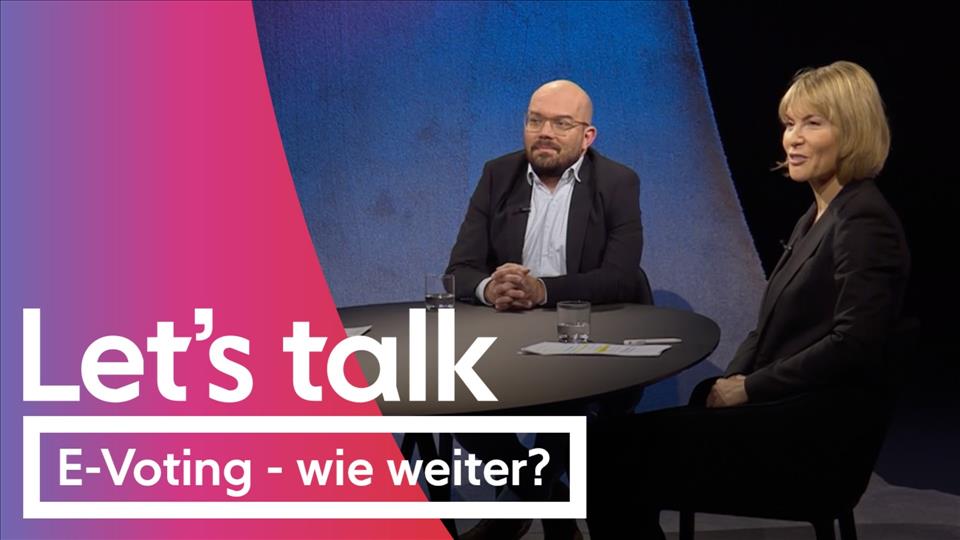
E-Voting: 'Financing Is Becoming A Hurdle'
The Organisation of the Swiss Abroad (OSA) supports the newly launched e-ID. "The electronic identity will make life easier for the Swiss Abroad," says the organisation's director, Ariane Rustichelli, in Let's Talk. She hopes that the Swiss Abroad will have better access to federal services and possibly also to those of Swiss banks.
For Ariane Rustichelli, it is also possible that this will bring the electronic dispatch of voting documents back onto the agenda. She says: "It won't solve everything, but it will solve part of the problem."
Martein Kristjansson, a teacher from Graubünden in Rejkavik, always has his Icelandic e-ID in use, as he tells Let's Talk via video call. "You need it to survive here," says the Swiss expat, for example for his bank account and the entire healthcare system.
Digital expert Reto Vogt describes Switzerland as innovative when it comes to the e-ID. "After the first 'no' vote by the people, it learnt very quickly how to implement an e-ID." But he also warns. In the worst case scenario, there is a risk of identity theft. "Everything that is digital can be hacked."
A question of trustSwitzerland has also wanted to introduce e-voting for almost 20 years, however, it is still not fully successful in its aim. This is because e-voting is also a question of trust - and this is where it ultimately failed. But the Swiss government kept going. A year ago, it launched new trials. E-voting trials are currently underway in five cantons. And it appears the trial are working.
However, Reto Vogt, editor-in-chief of Inside-IT, sees a danger in the complexity of the system. "Because a large proportion of the population doesn't understand the system, it's easy to spread doubt."
Financial hurdleAriane Rustichelli warns that the costs of the e-voting system could become more of a hurdle for the cantons. "The biggest obstacle to the introduction of e-voting is not so much a confidence issue as the financing," she says. "Many cantons have told us that the cost is extremely high."
Nevertheless, Graubünden, Geneva and probably Bern are set to join the cantons already trialling the system in 2024. According to Reto Vogt, ten cantons are needed by 2025 for the trial to ultimately pay off for the operator, Swiss Post.
The cost-benefit question can certainly be asked, says Vogt. For the IT specialist, one option is to make e-voting accessible to only part of the population. "Then the risk of manipulation is correspondingly lower."
Shaping the kind of democracy we wantHowever, Ariane Rustichelli points out that it is probably not possible for the cantons to develop the system for such a small group for cost reasons.
"The question is: what kind of democracy do we want?" says the OSA Director. "Do we want a democracy that is as diverse and inclusive as possible? A modern one in which young people participate?”.
As a citizen of Basel, Sandra Carrasco from Spain has already had experience with the new e-voting system, with good feelings, as she says in Let's Talk. She also has security concerns, if any, when voting by post.
Voting is a central part of Sandra Carrasco's connection to Switzerland. "Even if you can't live in Switzerland now, you still want to take part," she says.
Swiss Abroad Martein Kristjansson emphasises this. Voting and elections are still important to him even after 20 years in Iceland. "For me, it's part of my identity and a connection to my homeland," he says.
Cyber attacks are a threatThe Swiss government was affected by cyberattacks several times in 2023. The 425,000 addresses of subscribers to the Swiss Abroad magazine Swiss Review were also leaked onto the darknet. The hackers obtained these addresses by attacking the digital ecosystem of CH Media, where the publication is printed.
Reto Vogt suspects that this was a chance hit, a "six in the lottery for the hackers", as he puts it. For her part, Rustichelli speaks of a "horror scenario", even if the hack took place outside the OSA's sphere of influence.
"This has shown that Switzerland is very vulnerable," says Reto Vogt.
For Sandra Carrasco in Spain, the fact that people in Switzerland are talking about this and data security at all is not a matter of course, but "an advantage of Swiss democracy", as she says.
Legal Disclaimer:
MENAFN provides the
information “as is” without warranty of any kind. We do not accept
any responsibility or liability for the accuracy, content, images,
videos, licenses, completeness, legality, or reliability of the information
contained in this article. If you have any complaints or copyright
issues related to this article, kindly contact the provider above.

















Comments
No comment